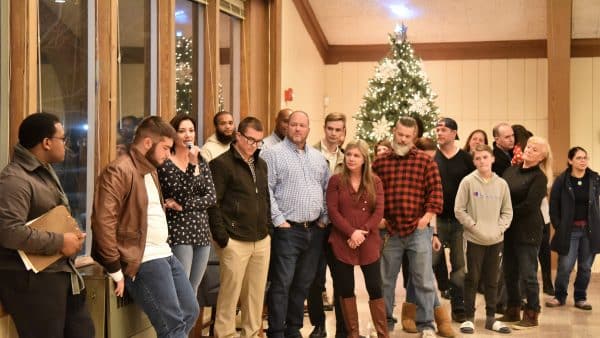Ethan stood humbly at the center of attention with a look of relief on his face and gratitude swelling in his heart.
He leaned his back against the wall and glanced around the room, where no less than 20 family members, friends, and UMFS staff were standing by his side. All had walked alongside him during his more than 12-month journey at the Child & Family Healing Center (CFHC), UMFS’ residential treatment program in Richmond. And all had gathered for this much-anticipated moment of Commencement, a ceremony that marks the completion of a young person’s time in residential care.
Though it’s been nearly three years since that proud occasion, Ethan (pictured second from left) remembers it well. The time he spent at CFHC, he said, was an important and necessary step on his path to healing.
“There are a lot of things you’re going to have to go through to progress to the next step in life,” Ethan said.
Wise words from a wise young man who — despite having endured trauma and unforeseen circumstances earlier in his life — has refused to allow adverse experiences from his past to impede the progress of his future.
*
It’s undoubtedly difficult for a young person to be away from their loved ones for an extended time. But being away from loved ones for an extended time while also working to overcome trauma is something else altogether.
“You have to have hope,” Ethan said. “Have hope and have patience.”
Before entering treatment at CFHC when he was 17, Ethan had a brief stay at another residential program. Ethan’s mother, Desiree, said it was a less-than-ideal experience that lasted barely a week. The whole situation, Desiree said, made both her and Ethan nervous.
“It’s a really hard place in your life to let a child go out of your care,” she said. But when Desiree and Ethan found UMFS, she said it was obvious that organizational culture and values were a good fit. What’s more is that the parent of another resident at CFHC pulled her aside. “Your child is in really good hands,’” the parent told her.
“It started from leadership that they really wanted to incorporate these core values,” Desiree said. “Even through hard times, the staff at UMFS is there to be part of the end goal. They really want to see these kids succeed.”
Confirming that sentiment was Ethan’s experience. Yes, the first few weeks at CFHC were an adjustment, he said. “I wanted to come home.” But as bonds began to blossom with staff and other residents, Ethan said he became quite comfortable.
Ethan even began foregoing trips home on the weekend, and that’s when Desiree said she knew significant progress was being made. “I’d say, ‘Do you want to come home this weekend?’” Desiree said. “And Ethan would say, ‘No, I think I’m good!’”
*
Therapy is a significant component of a young person’s treatment plan. Residents at CFHC participate in individual, group, and family therapy several times a week. But it’s not just the practice of therapy that impacts youth and families at CFHC, often it’s the therapists themselves who make the difference.
“She was amazing to work with,” Desiree said emphatically of Ethan’s therapist, Denise. “Even on his bad days, he liked having Denise around.”
The feeling was mutual, Denise said. “They’re a great family, and I really enjoyed working with them.”
“Ethan is genuinely a great person,” Denise continued. “He’s just so caring about everybody.”
And it was that sincere concern for others that Denise said she and Ethan focused on during their time together. Ethan had grown very fond of CFHC, and CFHC had grown fond of Ethan. He had a great rapport with staff and peers alike, but Denise wanted to be certain Ethan understood that his value extended well beyond the UMFS campus.
“We worked on accepting who he is, and we worked on understanding who he is outside of UMFS,” she said. “He worked hard to increase self-awareness and manage and accept emotions.”
Ethan said he began feeling anxious as he neared the end of his treatment. “When I was about to leave, I was always stressed about what I would see on the other side.” But in his heart, Ethan knew that in order to keep moving forward, he’d have to see for himself just exactly what was on the other side.
“Don’t let your fear drive you,” he said. “Go past your limits and your mental health and help yourself.”
Ethan successfully completed treatment, returned home to live with Desiree, graduated from high school, and then immediately went to work. He’s now 20, and Desiree couldn’t be prouder of all that he’s achieved.
“He’s been doing really well,” she said. “He’s been working nonstop. As soon as he graduated, Ethan said to me, ‘Alright, time to go to work!’” And go to work he did. Ethan earned certification in asbestos abatement and took a job working in construction. For a time, he was holding down two jobs.
“I was a parent who thought my child would never go to a residential treatment program,” Desiree explained. “Never in the beginning would I have thought I’d be sitting here today saying that UMFS changed the course of life for my child. But I honestly believe that it did, and Ethan believes it did, too.”
